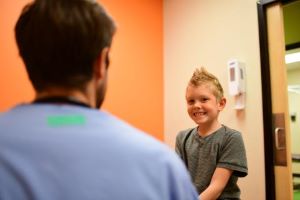
This fall, the first 10 students in ASU’s School of Social Work began the first one-year internship cohort working at Phoenix Children’s with young patients and their families. The internship will pair students with both a Medical Social Worker and an Outpatient Mental Health Therapist.
ASU and Phoenix Children’s have worked together for years training students interested in careers in health care, but physical and mental health is something that Phoenix Children’s and ASU have never worked on together.
“This program will be eye-opening for students,” said Jenifer Riggins, social services supervisor for Phoenix Children’s. “The ability to provide this level of care—directly serving our community—some students may find this is exactly where they want to be. I’m looking forward to seeing what these students bring to the program and the impact it’ll have on our community.”
This partnership represents one of the few programs in the U.S. offering instruction on clinical social work with children. It will help new therapists gain evidence-based practices and tools to provide high-quality care to pediatric patients. After the one-year internship, students will be eligible for a two-year fellowship, which begins in August 2022. Students who complete all of the training will be qualified to provide individual and family therapy.
While Phoenix Children’s and ASU hope to grow the field of pediatric mental health, they also hope this program will help meet the needs of our growing mental health crisis.
“We’ve seen a growing number of children and adolescents with rising health concerns—both mentally and physically—and many families struggling with the lack of mental health resources, particularly during the pandemic,” Riggins said. “Our intent is to create pediatric health therapists who are able to support the growing needs of our young patients and families.”
Historically, clinical social workers focus on mental health, while medical social workers help patients navigate chronic and physical illnesses. This program will give students direct experience in both areas—emphasizing the importance of the mind-body connection. Riggins said it’s their hope this program will create something great for the community and more support for patients and their families.
“A lot of times when you work with children, you’re also working with the family system,” Riggins said. “[Through the partnership], we’ll see more support for patients and families, giving parents the skills and tools to be that support system and force of nature. This, in turn, helps decrease mental health issues in our community and increases the ability to cope and be resilient when hard things come. We all face them—but if we have the skills, we can persevere.”
